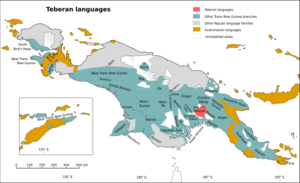Social:Teberan languages
| Teberan | |
|---|---|
| Geographic distribution | Papua New Guinea |
| Linguistic classification | Papuan Gulf or unclassified
|
| Subdivisions |
|
| Glottolog | tebe1251[2] |
 Map: The Teberan languages of New Guinea
The Teberan languages
Trans–New Guinea languages
Other Papuan languages
Austronesian languages
Uninhabited | |
The Teberan languages are a well established family of Papuan languages that Stephen Wurm (1975) grouped with the Pawaia language as a branch of the Trans–New Guinea phylum.
There are two Teberan languages, Dadibi and Folopa (Podopa). They are spoken in Southern Highlands Province and in adjoining provinces.
Classification
Malcolm Ross (2005) tentatively retains both Teberan and Pawaia within TNG, but sees no other connection between them. Noting insufficient evidence, Pawley and Hammarström (2018) tentatively leave Teberan as unclassified rather than as part of Trans-New Guinea.[3]
Pawley and Hammarström (2018) do not consider there to be sufficient evidence for Teberan to be classified as part of Trans-New Guinea, though they do note the following lexical resemblances between the Teberan languages and proto-Trans-New Guinea.[3]
Dadibi:
- ami ‘breast’ < *amu
Folopa:
- kabu ‘stone’ < *ka(mb,m)u[CV]
- kolemane ‘star’ < *kala(a,i)m ‘moon’
- kile ‘eye’ < *(ŋg,k)iti
References
- ↑ New Guinea World, Tua River
- ↑ Hammarström, Harald; Forkel, Robert; Haspelmath, Martin, eds (2017). "Teberan". Glottolog 3.0. Jena, Germany: Max Planck Institute for the Science of Human History. http://glottolog.org/resource/languoid/id/tebe1251.
- ↑ 3.0 3.1 Pawley, Andrew; Hammarström, Harald (2018). "The Trans New Guinea family". in Palmer, Bill. The Languages and Linguistics of the New Guinea Area: A Comprehensive Guide. The World of Linguistics. 4. Berlin: De Gruyter Mouton. pp. 21-196. ISBN 978-3-11-028642-7.
- Ross, Malcolm (2005). "Pronouns as a preliminary diagnostic for grouping Papuan languages". in Andrew Pawley. Papuan pasts: cultural, linguistic and biological histories of Papuan-speaking peoples. Canberra: Pacific Linguistics. pp. 15–66. ISBN 0858835622. OCLC 67292782.
